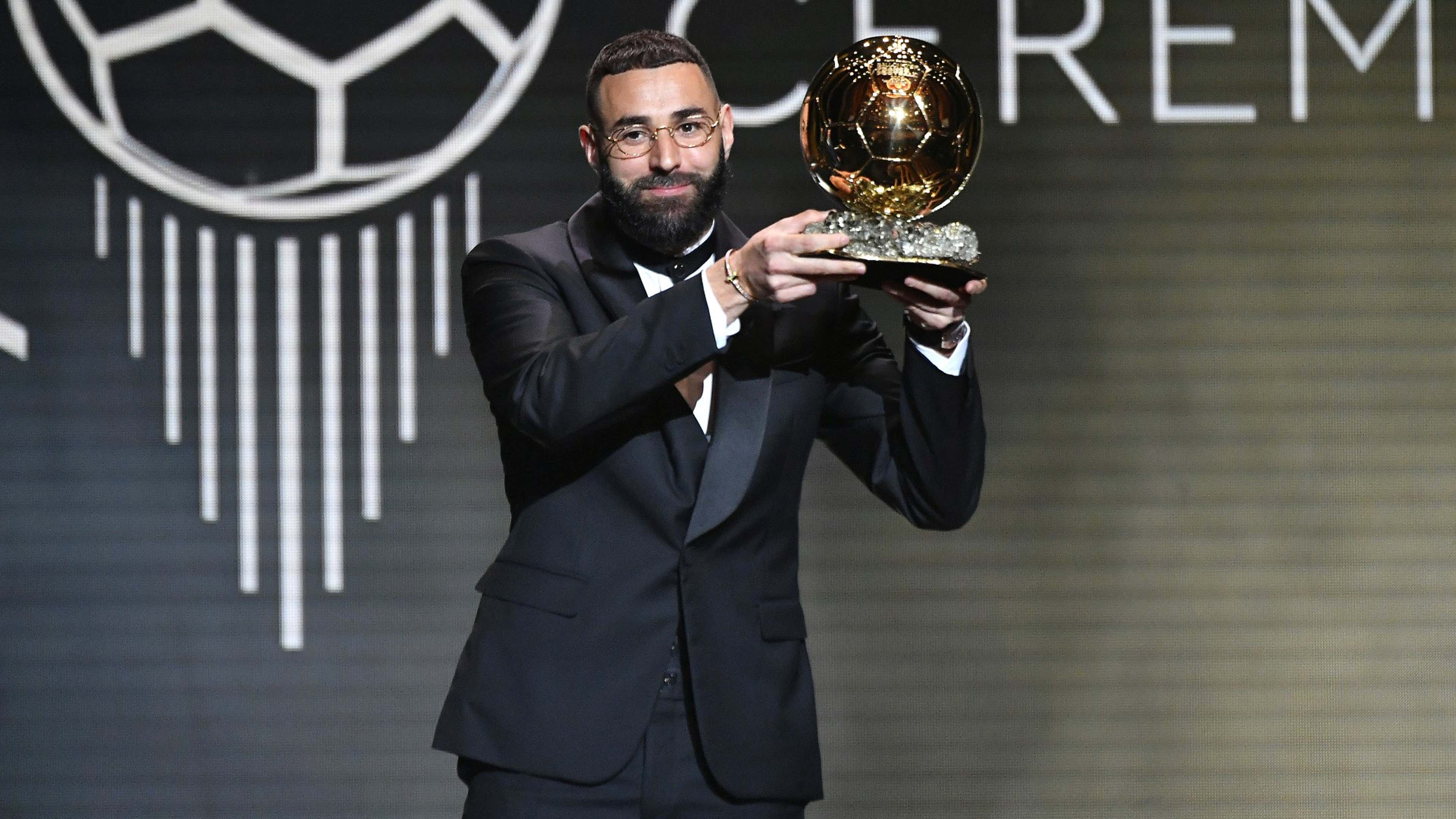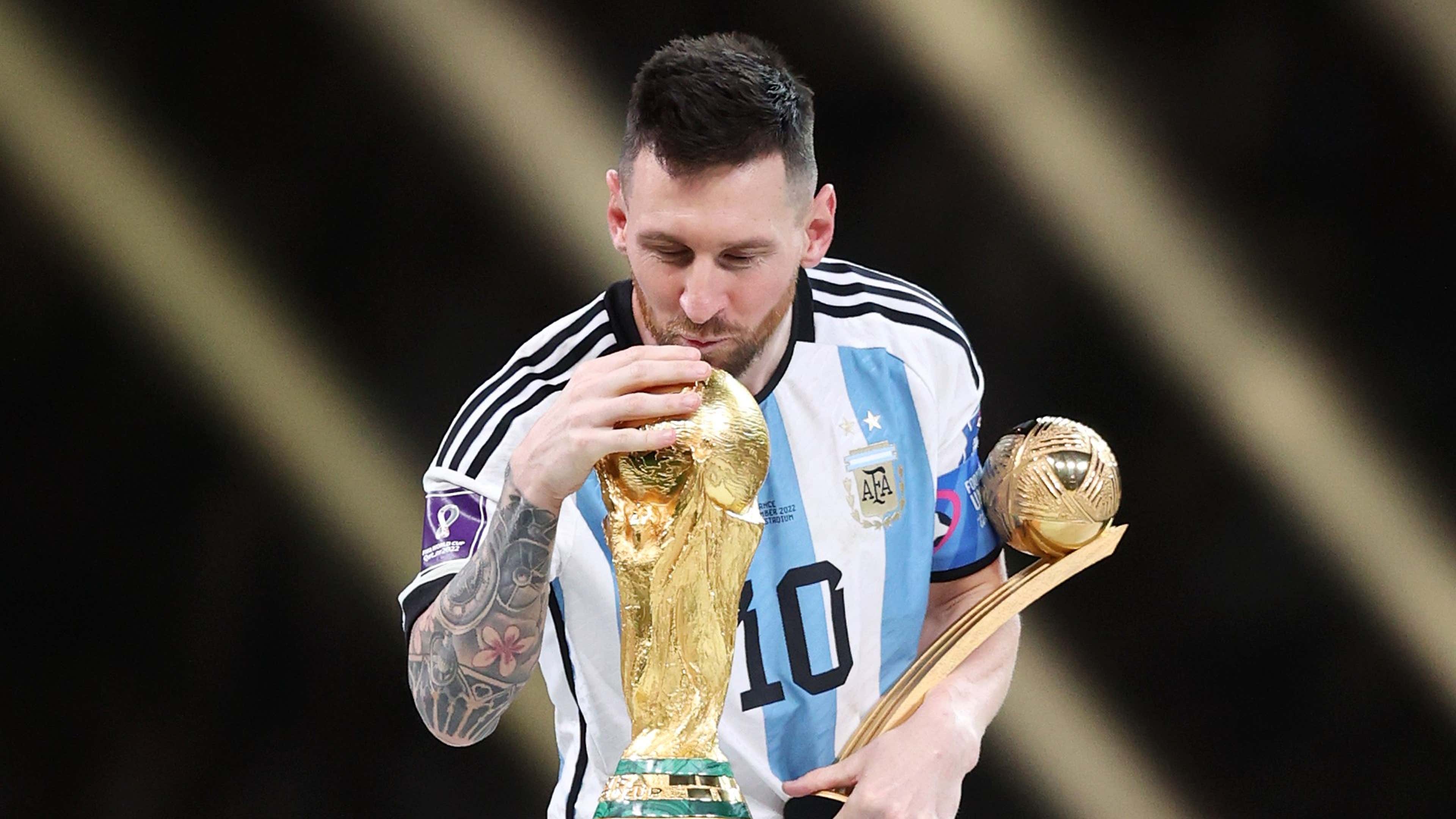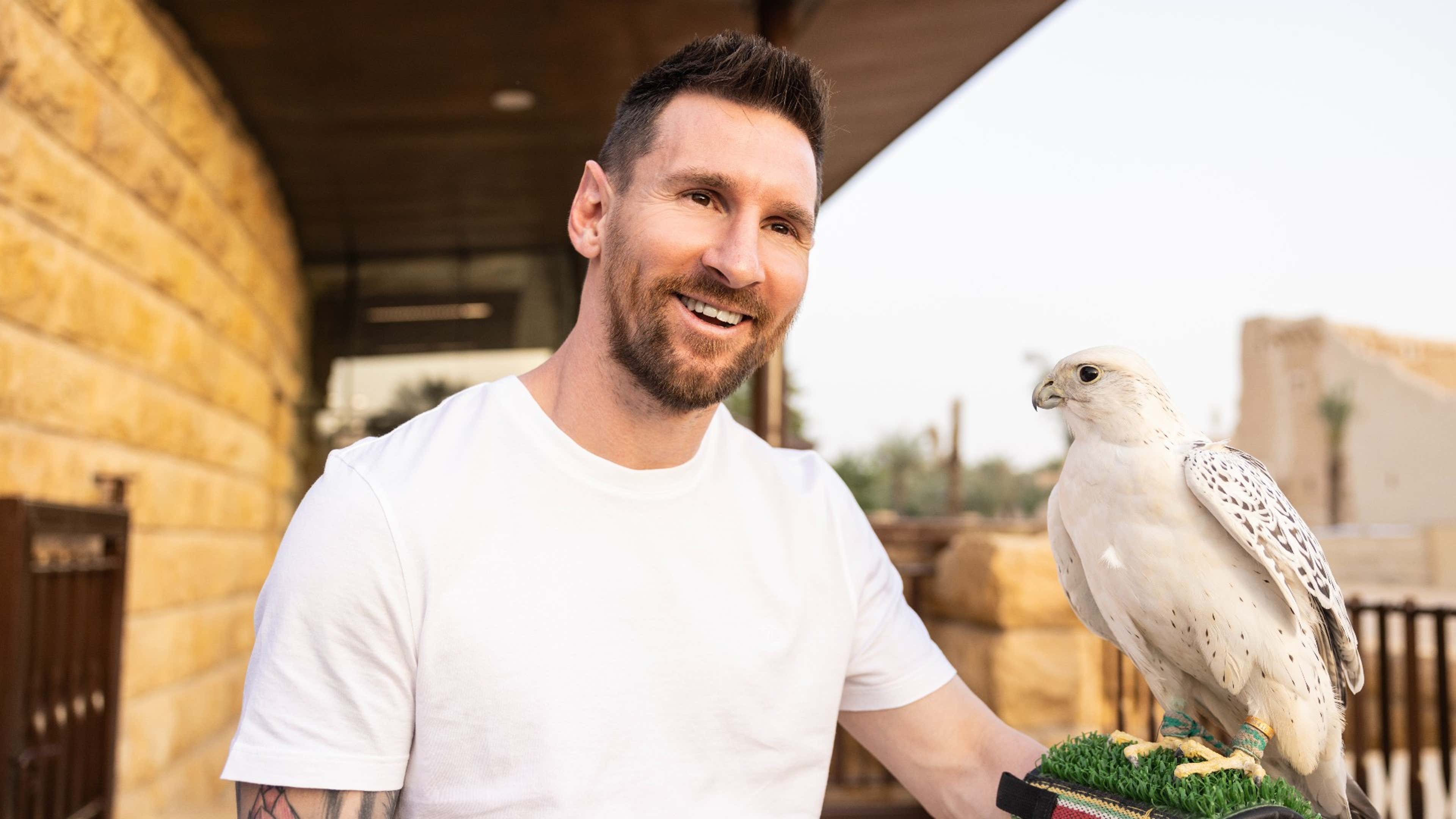The Argentine might have won the World Cup, but his form during the second half of the season threatens to derail his bid for an eighth Golden Ball
On Wednesday, as one elite footballer careened off into the Manchester night in celebration, another sat at home, somewhere on the European continent. The first had just scored his 35th Premier League goal of the season, smashing a record that had stood almost 30 years, with an emphatic dink. The second was, and still is, barred from playing football, suspended by his own club for two weeks.
Both of them, Erling Haaland and Lionel Messi, are among the top contenders for this year’s Ballon d’Or. But a few months ago, this wasn’t supposed to be a competition.
Messi rolled through the first half of the season at PSG in fine form, before enjoying his finest career achievement yet, completing football with a long-coveted World Cup win. Haaland was, in fairness, scoring in buckets and terrorising the Premier League, but with Manchester City having slipped behind in the title race and with Norway having not qualified for Qatar 2022, the battle for the Golden Ball did not feel like a fair fight.
But now, things have changed. Messi’s post-World Cup season has turned into a footballing wasteland, with only brief moments on the pitch punctuating what has otherwise been five months of transfer speculation and boos from PSG ultras. Haaland, meanwhile, has become the sharpened edge of a near-perfect team, the final-boss finisher of a potential treble-winning outfit.
That Ballon d’Or battle, once an exercise in silence, has become a full blown debate. And right now, Haaland might just win it.

Does it mean anything?
There are some caveats here. The Ballon d’Or isn’t voted on until August, and won’t be revealed for another two months after that. There is also, historically, an immense recency bias when it comes to the 100 journalists who cast their votes. Luka Modric, as impressive as his 2017-18 season was, certainly saw his campaign buoyed by an unlikely World Cup final run, which remained closer in the memory than the achievements of Messi and Cristiano Ronaldo that campaign.
It is also to be acknowledged that Ballons d’Or are a bit silly. They tend to be an internet measuring stick for trolls to pit incomparable players against each other, though there is no doubt that the players themselves are very invested in winning one – or eight.
Indeed, using the trophy to juxtapose Messi and Haaland would be a massive disservice to both. Messi is, these days, a player best appreciated by his body of work over 90 minutes. The Argentine still scores and assists at a European-leading rate, but it’s the way that he picks up the ball, dictates play and makes use of acute angles that make him among the world’s best at 35.
Haaland is inherently more quantifiable, both by nature of his position and terrifying goalscoring record. He’s broken the 50-goal mark this season, and started to chip in with some assists, too. Here is a ferociously direct goalscoring robot, steadily becoming sentient. If he doesn’t win this year’s Ballon d’Or, there will certainly be one in his future.
In the world of sensible football conversation, then, the honour pits two entirely different entities against each other. But these things aren’t necessarily rational. Fans want awards, and they want their favourite players to win them now

The case for Haaland
In this forum, it is Haaland who is pulling away. In any other year, his Ballon d’Or wouldn’t really be of any doubt. Domestically, Haaland is scoring in buckets while seldom touching the ball. He has bagged four hat-tricks and hasn’t gone more than three games without finding the net all season.
Add to that the fact that this is his first campaign playing in Europe’s most difficult league, with his side chasing down an emerging Arsenal in the title race, and no one in the world is having a better season domestically.
His European record makes for even more horrifically fascinating reading. Haaland has 12 goals in the Champions League. He scored five in one game against RB Leipzig and two across two legs in the quarter-finals against Bayern Munich. At 22-years-old, he mas more Champions League goals than Samuel Eto’o, Kaka and Wayne Rooney managed in their respective careers. With 35 in 27 games, Haaland could conceivably pass Cristiano Ronaldo’s record of 140 top-tier European goals.
Haaland is admittedly formulaic in his goalscoring, occupying the left side of the box before sweeping his shots into the far right corner. There is some variation to things, but the City attack is set up to ensure that Haaland gets the ball in the right space, at the right time, with goal to hit.
But there have still been some other-worldly moments of improvisation around that theme. There was the game-winner against former club Borussia Dortmund, when the striker to seemed to elongate his left leg while approximately 15 feet off the ground to meet a cross to the far post. There was the bullying of Arsenal, where Haaland delicately laid the ball off to an advancing De Bruyne, who ran through to score the goal that could well have dashed the Gunners’ title hopes.
There is a real chance, too, that Haaland could be the key in Man City breaking their Champions League duck. He could finish the year with 60 goals and three trophies. That is a freakishly good season — one of the best in football history.

The case for Messi
Messi, though, also hoisted a very important trophy at the end of December. The images alone of him lifting the World Cup express just how important the whole thing was to him. There was Messi lifting the trophy after full time; Messi sitting on his team-mates’ shoulders, paraded around the stadium; Messi kissing the trophy while cradling the Golden Ball as the tournament’s best player under his left arm; Messi waking up next to the trophy.
It was very clear that he didn’t part company with it for quite some time, and it was all deserved. Messi won the one thing that had previously eluded him at an age when most aren’t supposed to. He scored seven goals in the tournament, including two in the final. Everything that Argentina did went through him, too. Messi is the best to ever do it, and Argentina set up to allow him to show why he is so good.
There is an element of relief to his campaign, too. Messi has enjoyed unbounded success at the club level, but famously struggled for Argentina. He had lost in the World Cup final in 2014 and blasted a penalty over in the Copa America showpiece two years later. He was dubbed a bottler for Argentina, a player always destined to have that one glaring hole in an otherwise glittering resume.
But then, he did it. And the argument here is that everything else is rendered meaningless. Messi won the trophy he’d always coveted, and was the best player at the tournament while doing so. One for the football romantics, indeed, but a near-unbeatable case for the Ballon d’Or nonetheless.

Messi made a mistake
Then, Messi did a very atypical, self-indulgent thing. It is disheartening to see a footballer representing the nation-state of Qatar collect hundreds of millions from the nation-state of Saudi Arabia. It is even worse to see him do it consciously. Messi, it has since emerged, knew his suspension was coming. He was informed by manager Christophe Galtier that the team would have to report to training on Monday morning if they lost to Lorient.
As Messi stormed down the Parc des Princes tunnel following a 3-1 defeat, then, he knew he had a team engagement in less than 24 hours. And he got on a plane, anyway. Messi, as a result, is banned for two weeks. It is possible, if not likely, that he doesn’t play for PSG again. He has lost the faith of the fans, first booed, then sworn at by the club’s most loyal supporters.
And although his manager is yet to comment on Messi’s future beyond the next fortnight, the Argentine has done something pedantic here. His Paris Saint-Germain career was fading to an anticlimactic end anyway. This was a disappointing way to speed up that process.
It’s come at the exact wrong time for his Ballon d’Or campaign, too. Messi was already allowing the gap in this argument narrow. His post-World Cup showings have been dire at times, and while he still has 12 goal contributions to his name, he’s now something of a ghostly figure sort of strolling near the centre circle for most contests.
There is also his team’s form to consider. PSG have been knocked out of the Champions League by a struggling Bayern Munich side and bounced from the Coupe de France by arch-rivals Marseille. Meanwhile, a double-digit Ligue 1 lead has shrunk to just five points.
Messi is not only to blame here — some of PSG’s defending has been miserable, while Kylian Mbappe has also been short of his best — but Ballon d’Or contenders don’t often point fingers elsewhere.
He is playing — and now not playing — his way out of contention.
.jpg?auto=webp&format=pjpg&width=3840&quality=60)
Haaland over Messi?
And that’s where Haaland comes in. A handful of players have enjoyed similarly prolific seasons and failed to win the Ballon d’Or. Cristiano Ronaldo, at his scintillating best in 2012, bagged 60 and still failed to take home the award. And it’s not just been strikers, either. Virgil Van Dijk was a real contender in 2019, winning the Champions League and anchoring a Liverpool side that finished the Premier League with 97 points. But every time, Messi has been the blockade. Whether by statistics or performance, the little Argentine has been a step above everyone else.
And for long stretches this season, Messi has still been the best in the world. His World Cup performances were spellbinding, with the Argentine orchestrating Argentina’s first global title since 1986. The winner against Mexico, impossible assists against Croatia and the Netherlands, and double in the final will stand out. But his level of play throughout was mesmerising.
The Albieceleste weren’t just a one-man show by any means. There was quality elsewhere in the Argentina side, but it was Messi’s ability to bring the best out of those around him that led to a World Cup win. Enzo Fernandez, now of Chelsea, is not a £106.8 million ($131m) player without his No.10.
Those moments, although not forgotten, will have been pushed further back into the minds of Ballon d’Or voters. Recency bias is real, and although Messi has achieved something historic for his country, Haaland is smashing records for his club right here, right now.
Haaland is still on the pitch. Messi, meanwhile, is at home, watching his grip on an eighth Ballon d’Or steadily slip away.
Source: goal.com








